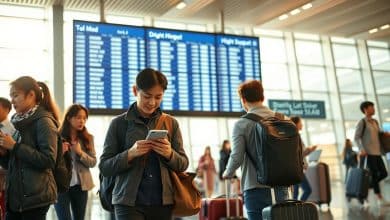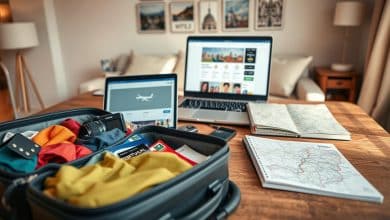New Zealand Arrival Guide: Step-by-Step Flight Preparation for Migrants
Traveling to New Zealand is both thrilling and challenging for migrants, especially those from Nigeria.
The New Zealand Arrival Guide is here to help. It covers all the key steps for new zealand travel flight preparation.
This guide explains visa needs and health and safety rules. It makes sure you know everything about moving to New Zealand. With these travel tips, you can start your journey with confidence.
Understanding Visa Requirements for New Zealand
Getting a visa for New Zealand can be tricky. It’s important to know the different visas available. Nigerian citizens need to pay special attention to the application process.
Types of Visas Available
New Zealand has many visa options. These include:
- Visitor Visa: Great for tourism or visiting loved ones.
- Student Visa: Needed for studying in New Zealand.
- Work Visa: For jobs, especially in in-demand skills.
- Resident Visa: For those wanting to live there permanently.
Choosing the right visa is key based on your plans.
Application Process for Nigerian Citizens
Nigerian citizens have a few steps to follow:
- Find the visa that fits your goals.
- Get the needed documents, like a passport and health insurance.
- Fill out the forms correctly and submit them online or in person.
- Pay the fees and know the processing time, which varies.
Staying up-to-date with visa requirements is crucial.
Common Mistakes to Avoid
Knowing common mistakes can help. Nigerian applicants should:
- Not forget necessary documents, which can delay things.
- Avoid giving wrong or misleading info, which can lead to denials.
- Don’t miss the deadline for submissions, or you might miss out.
By following travel tips and staying informed, you can make the visa process easier.
Preparing for Your Flight
Planning a trip to New Zealand means getting ready for your flight. A good checklist can make your travel better. This part talks about booking flights, picking the right airline, and knowing luggage rules.
Booking Your Flight: Best Practices
Begin by looking at different booking sites to find the best prices. Use websites that compare airfares to find deals that fit your budget. Being flexible with your travel dates can also help you save money.
Setting up fare alerts can keep you updated on price changes. Choose direct flights when you can to make your trip smoother.
Choosing the Right Airline
Picking the right airline is key for a comfortable trip. Look at reviews to see how airlines perform. Check if they offer direct flights and have fewer layovers.
Choosing a reputable airline is important for a good experience, especially on long flights.
Luggage Restrictions and Requirements
Knowing the luggage rules can avoid problems at the airport. Each airline has its own rules for weight and what you can’t bring. Check these before you pack to avoid extra costs.
Also, make sure you know what you can bring into New Zealand. Confirming this before you pack is crucial for a smooth start.
By following these tips, you’ll be ready for your flight. This makes starting your New Zealand adventure easier. A well-planned trip sets the stage for a great time in New Zealand.
Health and Safety Considerations
Traveling to New Zealand requires careful health and safety planning. Knowing the needed vaccinations, getting the right travel insurance, and following COVID-19 rules are key. These steps help ensure a safe trip and meet health requirements for traveling to New Zealand.
Vaccination Requirements for Travelers
Before you travel, it’s important to know the vaccinations you need for New Zealand. Some important ones include:
- Measles: Very important during outbreaks.
- Hepatitis A: Recommended for all travelers.
- Influenza: Getting a flu shot is a good idea.
Keeping up with your vaccinations is not just for New Zealand. It also protects your health when you’re away from home.
Travel Insurance: Why It Matters
Getting travel insurance is a must for every traveler. It covers unexpected medical costs, trip cancellations, and lost items. When picking a policy, look at:
- How much it covers for medical costs
- Options for emergency evacuation and getting back home
- What happens if you need to cancel your trip
Travel insurance is a big part of staying safe while traveling to New Zealand. It helps protect you from unexpected problems that could ruin your trip.
COVID-19 Protocols and Guidelines
Knowing the COVID-19 rules is crucial for traveling to New Zealand. These rules can change, so always check the latest information. Current rules usually cover:
- Tests you need before you leave
- Quarantine rules, if needed
- Proof of your vaccination
Keeping up with these rules helps make your trip smoother. It also makes sure you follow health requirements for New Zealand travel.
Currency and Financial Preparations
Before you arrive in New Zealand, getting your finances ready can make settling in easier. It’s key to know about currency exchange and the local banking system. This guide will help with new zealand currency tips, opening a bank account, and understanding living costs.
Currency Exchange Tips
For exchanging currency, look at different options to find the best rates. Local banks usually offer better rates than airports. Airport currency exchange desks charge more fees.
- Check current exchange rates before you arrive to find good deals.
- Use credit or debit cards with low foreign transaction fees.
- Withdrawing cash from local ATMs in New Zealand can give better rates.
Setting Up a Bank Account in New Zealand
Opening a bank account in New Zealand is easy with the right documents. Having an account makes transactions simpler and reduces the need for cash.
- You’ll need a passport, proof of address, and a visa (if needed).
- Choose banks like ANZ, Westpac, or ASB to open an account.
- Look into banking fees, like monthly costs and withdrawal limits.
Understanding New Zealand’s Cost of Living
It’s important to budget for living expenses in New Zealand. Costs vary based on housing, transportation, and food. Knowing these costs helps with financial planning.
| Expense Category | Estimated Monthly Cost (NZD) |
|---|---|
| Housing (Rent) | 1,500 – 2,500 |
| Transportation | 150 – 250 |
| Groceries | 400 – 600 |
| Utilities | 250 – 400 |
Packing Essentials for New Zealand
Getting ready for a move to New Zealand means having a good packing list. Knowing what to wear and other must-haves makes settling in easier. New Zealand’s weather changes a lot, so you’ll need clothes for different seasons. You’ll also need important documents and electronics for daily life.
Clothing Suitable for New Zealand’s Climate
New Zealand’s weather is varied, so you’ll need clothes for all seasons. It’s smart to pack layers that you can adjust as the weather changes. Here are some key items to consider:
- Lightweight rain jacket for sudden downpours.
- Warm sweaters or fleeces for colder evenings.
- Comfortable hiking boots for outdoor adventures.
- Casual clothing for everyday wear.
- Swimwear for beach outings.
Important Documents to Bring
Having the right documents is key for living in New Zealand. Here are some important ones to remember:
- Passport and copies of it for identification.
- Visa documentation confirming legal entry and residence.
- Health records, including vaccination proofs.
- Emergency contacts to refer back to.
Electronics and Adapters
Don’t forget about your electronics when packing for New Zealand. Since New Zealand uses Type I power plugs, you’ll need an adapter. Here are some essential electronics to pack:
- Mobile phone and charger for communication.
- Laptop or tablet for work or personal use.
- Camera to capture memories.
- Portable power bank for charging on the go.
Arranging Accommodations in New Zealand
Finding the right place to stay in New Zealand is key for new migrants. There are many options to fit different needs and budgets. Knowing what’s available and how to find it makes settling in easier.
Types of Accommodation Available
New Zealand has a variety of places to stay. This means everyone can find something that suits them. Here are some options:
- Hotels: Great for short stays, offering comfort and convenience.
- Hostels: A budget-friendly choice, especially popular among younger travelers.
- Rental Apartments: Perfect for those wanting privacy and independence.
- Shared Housing: An economical way to live with others while sharing costs.
Tips for Finding Short-Term Housing
Finding a place to stay in New Zealand can be tough. Here are some tips to help:
- Use local websites and apps for listings.
- Network with fellow migrants or local contacts for recommendations.
- Consider reaching out to real estate agents who specialize in short-term rentals.
- Be cautious and verify property details before committing to a rental agreement.
Booking Long-Term Houses or Apartments
When looking for long-term accommodations, consider these factors:
- Location: How close it is to work, schools, and public transport matters a lot.
- Price: Having a budget helps find options that fit without overspending.
- Lease Agreements: Knowing the lease terms is important for clarity on duration, deposits, and legalities.
Transportation Options After Arrival
When you arrive in New Zealand, you’ll find many ways to get around. The public transport system is well-organized, covering both cities and rural areas. Knowing your options can make settling into a new place easier.
Public Transport System Overview
Buses, trains, and ferries are the main ways to travel in New Zealand. Cities like Auckland, Wellington, and Christchurch have big bus networks. Trains connect distant areas, offering beautiful views. Ferries are great for crossing coastal waters, especially in Auckland.
Overall, public transport is affordable and easy to use. It’s perfect for newcomers.
Car Rentals and Driving Regulations
If you’d rather drive, car rentals are easy to find. Companies like Hertz and Avis have a range of cars. You’ll need a valid driver’s license to drive here.
International licenses are usually okay, but check with your rental company. Knowing the local driving rules is key for safe travel.
Alternative Transportation Options
There are other ways to get around too. Uber rideshare services are common in cities. Biking is also popular, with bike lanes and rentals in urban areas.
Biking is good for the environment and lets you see local areas slowly.
Understanding Local Culture and Customs
New Zealand’s culture is rich and varied. It’s shaped by the Māori people and influences from Europe and the Pacific. To fit in, it helps to know the local etiquette, understand cultural differences, and connect with the locals.
Essential Etiquette for New Zealanders
New Zealanders like to be friendly and use first names right away. Saying “Kia ora” with a smile is a good start. Being on time is key, and respecting personal space helps in making friends.
Major Cultural Differences
Knowing the differences between Nigeria and New Zealand is important. Nigeria values respect for elders, but New Zealand is more about equality. New Zealand’s direct way of talking might seem harsh at first, but it’s just being straightforward.
Connecting with the Local Community
Getting to know the locals in New Zealand makes it better for newcomers. Joining in community events, volunteering, or clubs is a great way to meet people. Attending cultural festivals is also a good way to learn about the culture and make friends.
Settling In: Services and Support for New Migrants
New migrants in New Zealand have many support services and community resources. These can help them settle into their new home. Knowing about these options is key for a smooth transition.
Government Services for New Arrivals
The New Zealand government has many support services for new migrants. They offer orientation sessions to learn about local customs and legal rights. There’s also help finding housing and understanding local laws.
These services aim to make adjusting to life in New Zealand easier.
Community Organizations to Connect With
Connecting with local community resources in New Zealand is very helpful. Groups like the New Zealand Red Cross and migrant support groups help newcomers. They organize social events, workshops, and networking to help people meet others.
Language Resources for Non-English Speakers
For those who don’t speak English, language resources are essential. There are English language classes for non-English speakers. Some groups also offer translation services for important talks, like medical visits or government meetings.
Exploring New Zealand: Must-See Attractions
New Zealand is full of amazing sights, calling out to travelers for unforgettable adventures. From famous spots in the North Island to the South Island’s natural wonders, it offers a unique glimpse into the country’s landscapes and culture.
Iconic Landmarks across the North Island
The North Island boasts several must-see places. The Sky Tower in Auckland, at 328 meters, gives stunning views of the city. The Hobbiton Movie Set is another gem, where fans of The Lord of the Rings can explore.
These attractions show how modern and traditional cultures blend in the North Island.
Natural Wonders in the South Island
The South Island is known for its incredible natural beauty. Milford Sound, a UNESCO World Heritage Site, is called the eighth wonder of the world. Its fjords and waterfalls are breathtaking.
The Southern Alps offer great hiking, skiing, and photography spots. These landscapes are a true highlight of exploring New Zealand.
Tips for Local Travel and Exploration
Travelers should rent a car for flexible exploration. Guided tours offer deeper insights into local history and culture. Planning ahead is key, especially in busy seasons.
Embracing the local spirit makes the trip more rewarding. It helps you connect with this incredible country.
Preparing for Future Immigration Requirements
As new migrants settle in New Zealand, knowing the immigration rules is key for a long-term stay. To secure a stable future, meeting the residency criteria is crucial. This involves employment, health, and character checks for successful applications.
Understanding Residency Requirements
To get permanent residency, migrants must meet several requirements. They need to have lived in New Zealand for a set time on a valid visa. It’s also important to know the skill levels needed in your job and to have a clean criminal record.
Roadmap to Permanent Residency
The path to permanent residency is clear. After a certain time on a temporary visa, you need to gather documents. These include proof of work, personal ID, and health checks for your application. Knowing what documents you need can make the process smoother and avoid delays.
What to Expect During the Transition
Getting permanent residency is a big change for new immigrants. It means adjusting to new visa rules and getting to know the local culture. Staying updated on immigration news and making friends in the community can help make this transition easier.
For more information, see the official travel site:
You will be redirected to another website
FAQ
What are the key travel tips for New Zealand?
When traveling to New Zealand, check visa needs and book flights early. Make sure you’re healthy and up-to-date on vaccinations. Learn about local customs and the weather.
Also, pack everything you need and have travel insurance for safety.
What should be included in the New Zealand flight checklist?
For your New Zealand flight, confirm your flight details and have your passport and visa ready. Pack important documents and book your stay. Check health requirements and airline luggage rules.
How can I prepare for a trip to New Zealand?
Start by researching visa needs and health guidelines. Plan your budget for currency and learn about the culture. Make a packing list for New Zealand’s weather and book your accommodations early.
What are the travel essentials when visiting New Zealand?
Travel essentials for New Zealand include a valid passport and visa, and necessary vaccinations. Don’t forget travel insurance, comfy clothes, and adapters for your electronics. Also, have enough money for local expenses and a guidebook or app for exploring.
What is the best way to pack for New Zealand’s climate?
Packing for New Zealand’s climate means considering the seasons. Bring clothes that can be layered for different temperatures. Include waterproof gear and comfy shoes for walking.
Remember to pack sun protection and any needed medications.
What should I know about travel safety in New Zealand?
Travel safety in New Zealand means knowing local laws and keeping valuables safe. Learn emergency numbers and stay informed about travel advisories. Always follow safety guidelines for outdoor activities.
Published on: 16 de April de 2025

Galena Garcia
Galena Garcia is the visionary behind Portal Santista. With a degree in Business Administration and a specialization in Marketing for the financial sector, Galena brings years of experience from the corporate world, where she developed a deep passion for helping both businesses and individuals thrive financially.
Driven by a desire to share her knowledge with a broader audience, she founded Portal Santista—an online space dedicated to providing useful, practical, and reliable information on finance, marketing, and business management.
Outside of her professional life, Galena is an animal lover, a devoted reader of romantic novels, and loves spending fun moments with her nieces and nephews. Her unique blend of technical expertise and genuine care for people is what makes Portal Santista such a special place.






